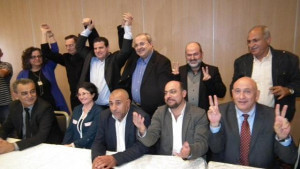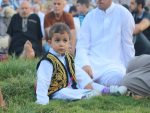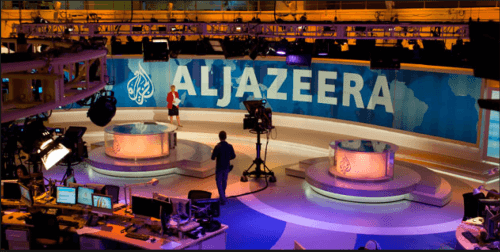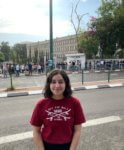By Ray Hanania

The decision by Israel’s Arab political parties to create a “joint list” in the upcoming March 17 Israeli Knesset elections has put the spotlight on Israel’s historic contradictions claiming on one hand to be a “Democracy” but in reality embracing racist and discriminatory practices.
In the past, the majority of Arab Israeli voters have boycotted the Israeli Knesset elections weakening the Israeli Arab vote. But this year, as a result of racist efforts to legislatively prevent non-Jews from participating in Israel’s elections by raising the participation threshold to block Arab Party participation, the three major Arab Parties came together to create one “list” in the election.
Although Israel asserts it is a “Democracy,” in truth it’s elections are unDemocratic and are based more on the British system of parliamentary elections which erodes the core foundation of a true Democracy, making every voter equal and guaranteeing that every individual over a certain age (usually 18 or above) enjoy “one-person, one-vote” rights.

Under the parliamentary process, which favors Jews over non-Jews, representation is based not on one-person, one-vote principles, but rather on the collective achievements of a coalition in the form of a party. Voters don’t vote for individuals but rather vote for party lists which include names of party candidates in an order from top to bottom. The higher the total vote a party list receives, the more members of their list, starting at the top, are allowed to take seats in the Knesset.
In an effort to block non-Jews from participating in the Knesset, the Jewish majority adopted a new law that increases the “minimal required vote” that a party must receive in order to qualify for any seats on the Knesset. The only way to overcome this new Israeli Apartheid-hurdle was to consolidate Arab parties into one Party List on Jan. 22, 2015 called “The Joint Arab List.”
A new report issued by the Arab Association for Human Rights (HRA) has detailed the historic racism that has driven Israeli politics, but also shows how the recent efforts by Israel to silence the Arab Israeli vote may have in fact helped to strengthen it. Israel adopted “The Threshold Law” last year (March 11, 2014, Governance Law) that was endorsed by the Israeli Supreme Court which requires a party list to receive 3.5 percent of the total votes cast, up from 2 percent, a number that has been increased in the past. The intent of this limitation is to disenfranchise non-Jews from the voting process. Even the Israel Supreme Court acknowledge that the law was punitive, arguing that since a majority of Arabs boycott the election, they should be permitted to participate.
A critical point, the HRA reports notes, is that despite the claim of being a Democracy, no Arab party has ever been invited to become a part of any of Israel’s ruling government coalitions. There have been some non-Jewish members of Israel party lists who have served in the Knesset, but never as party coalitions.
Three Arab Parties currently hold 11 seats in the Knesset’s 120 seats. They are the Hadash Party (Jabha or leftwing), Balad Party (Tajammu), and United Arab List (Raam Taal) led by Ahmed Tibi. Two smaller Arab Parties were not included in “The Joint Arab List” and will be on the ballot as “The Arab List.”
Here’s a detailed summary of all three parties:
Hadash (Arabic: Jabha) – A coalition of leftwing parties, led by the Israeli Communist party. It is the only major political party in Israel that defines itself as a joint Arab-Jewish party, though over the years it has come to be dominated by its Arab membership and it is reported to poll only a tiny proportion of votes from the Jewish population. Its platform highlights a demand for equality.
Balad (Arabic: Tajammu) – An Arab nationalist party whose main platform is that Israel be reformed from a Jewish state to “a state for all its citizens”. It believes the Palestinian minority is entitled to national collective rights, especially in terms of cultural and educational autonomy.
United Arab List (Arabic: Raam-Taal) – A coalition between the southern Islamic Movement and the Taal party, led by Ahmed Tibi. The party has been mainly active among Arab voters in the Triangle and Negev regions rather than the Galilee. It is considered to be pragmatic (contrasting with the extra-parliamentary approach of the northern wing of the Islamic Movement) and calls for greater integration of the Arab minority in Israel.
The Joint Arab List hopes to increase their participation from 11 seats to 15 seats and they are encouraging Arab citizens of Israel to participate in the Knesset elections, rather than boycott as the majority of Arab voters have in the past, in order to create what could be one of the largest party lists. It might force Israel for the first time to create a ruling coalition that includes Arab representation.

“The Joint List has promoted itself to Arab voters in terms of its becoming the third or fourth largest party in the Knesset, suggesting that this will give it weight after polling day in the negotiations to create the next coalition. However, the List has not been clear about whether it is willing to be part of such a coalition,” the report notes.
“Recent elections have seen a steady drop in the turnout among Palestinian citizens to the point where barely more than half of voters participated in the elections of 2009 and 20132. The trend towards lower turnouts is generally ascribed to two main factors, one based on principle, the other pragmatic.”
The boycotts have been driven by the belief that Israel has intentionally sought to impose Apartheid-like policies and to exclude non-Jews from governments. And, the other driving view is that any participation is a form of “normalization” which gives credibility to Israel’s insistence that it be a “Jewish State,” rather than a truly Democratic State.
Israel continues to see a rise in extremist, right wing politics represented by Israel’s Foreign Minister Avigdor Lieberman who argues that anyone who questions Israel’s foreign policies and its occupation of the 1967 territories are promotes the racist concept “No citizenship without loyalty.” To Lieberman, “loyalty” means subservience to the rightwing racist agenda.
Lieberman and Israeli Prime Minister Benjamin Netanyahu, and their party coalition members, have turned to racist and hate speech when addressing non-Jews (Christian and Muslim Arabs). The Israeli hate-speech has intensified.
To further undermine Democracy and block the participation of non-Jews in the Knesset, Israel has targeted non-Jewish Israeli political candidates in much the same way that early American racists and segregations in the 1950s targeted Blacks to prevent them from participating in elections.
“As has now become a ritual at election time, the main Israeli parties have targeted Arab politicians for disqualification during the current campaign. In previous elections, the Supreme Court has reversed the decision to disqualify on appeal at the last moment. However, the court is facing greater political pressure than ever before not to interfere at this election,” the HRA report notes.

“The main target, as in recent elections, has been Haneen Zoabi, whose disqualification is supported by all the main parties. Lieberman’s Yisrael Beiteinu party is also seeking to win support for barring the Joint Arab List from running. In a statement, the party said it was important to disqualify the list ‘to avoid an absurd situation in which members of Knesset act against the state.’19 The CEC is due to issue its final disqualifications in late February.”
Zoabi is the first female candidate to be elected to the Israeli Knesset on an Arab Party list. She has been attacked because of her political statements criticizing Israeli racism and settler violence against Arab Christians and Muslims.
The Israel case against Zoabi underscores the discrimination and racism that exists in Israel where Jewish Israelis are permitted to express their opinions freely and without consequences but non-Jewish Israelis are accused of treason and criminal acts when they criticize Israeli government policies. The campaign against Zoabi underscores the growing Apartheid nature of Israel’s society and government.
Adalah, the legal group that represented her, issued a statement warning that this was a “dangerous precedent.”
“For the first time ever, the court has decided that the majority can judge the minority solely on the basis of its political expressions – and impose radical sanctions … In effect, from this day forward, Arab Knesset members will be subject to the political judgements of the Jewish majority.”
Zoabi has described the political legislation that targets her specifically as both being unDemocratic and “an assassination of my image.”
While many in the Arab World are pushing Arab Israeli citizens to boycott the elections and reject “normalization,” many others believe that participation and working from “within the Israeli system” can help change Israel’s increasing racist and Apartheid practices. Or, participating could call Israel’s bluff and force the so-called “Democracy” to finally acknowledge it is not a Democracy and impose horrific restrictions on non-Jews similar to restrictions that were imposed on Jews by the Stalinists in Russia, the Nazis in Germany and also in Western countries.
To view the report, click here.


- Israelisnipers shooting and killing hospital workers in Gaza - December 11, 2023
- CAIR Condemns Israeli Executions of Wounded, Unarmed Palestinian in West Bank - December 11, 2023
- Arab and Muslim American voters face a “simple choice” between Biden’s inhumanity and Trump’s edgy politics - December 9, 2023

























